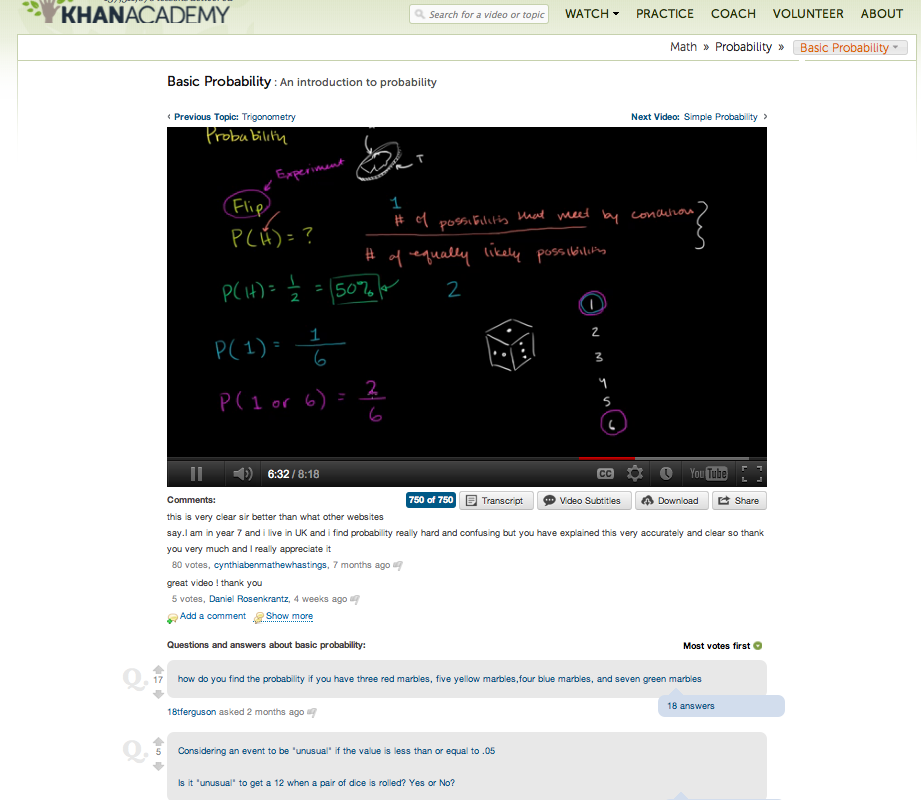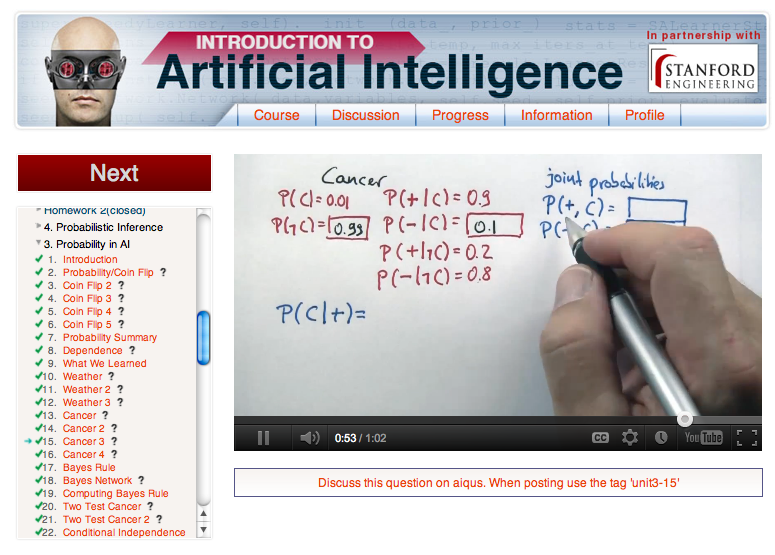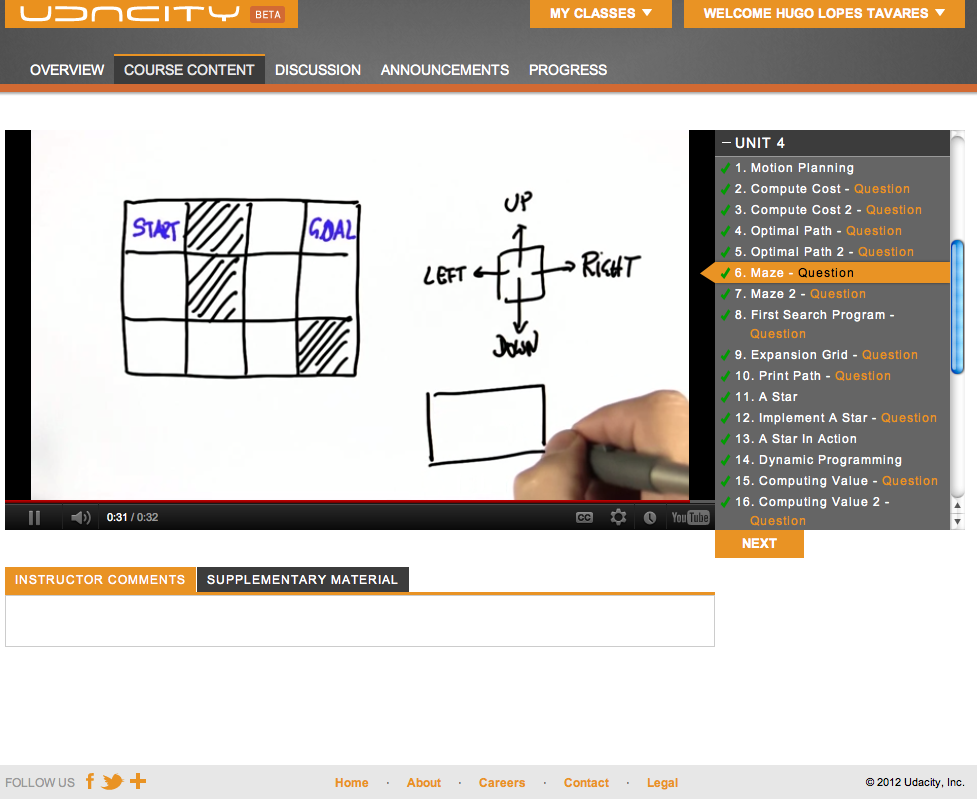Rethinking Education
I dropped my bachelor degree in 2010 while I was in the second semester; my classes were boring, some teachers were not updated to what is happening in the industry (some not even in the academia), and most of the students were not interested in learning, they just wanted to get enough score to go to the next semester.
That was not right. Maybe my university or my course was not good enough. Or maybe the way the university teaches is not as good as it could be.
Every person learn in a different pace, and in a class with 30 or more students someone will be left behind, and others will get bored because they learn in a faster pace.
All text that follows is based on my experiences.
The Start of a Revolution
In 2002 MIT started MIT OpenCourseWare, an initiative to put all their material from undergraduate and graduate courses online to everyone; no other well named institution had anything like that, they pioneered. After some time other universities started to do the same, and projects like CS50 from Harvard were born. I’ve watched CS50 videos and they are gold material.
Institutions started to put recorded video classes, pdfs, textbooks, and assignments online, but it was not enough. Something was missing.
Khan Academy And Short Videos
Salman Khan started to record videos to help his cousin with math, and uploaded them to YouTube. In a short amount of time he was recording more videos to help more people in the family. And them friends. It was so quick and enlightening that Khan founded Khan Academy, a non-profit organization with a noble mission: change the world education.
Khan Academy’s video format is very nice, all videos are about 10 minutes - they break a subject into many short videos. It is much easier to grasp the content this way.
Students can pause, go back to some point they did not understand very well, replay, watch later, read what other students are saying in the comments, practice with many online exercises, and do all this any time.
Khan Academy started with Math, but now it is about Math, Computing, Biology, Physics, History, and much more. There are more than 3,100 videos on many subjects.
Watch Salman Khan at TED: http://www.ted.com/talks/salman_khan_let_s_use_video_to_reinvent_education.html
AI Class and the Concept of a Class
Last year I saw an announcement of an Introduction to Artificial Intelligence free course offered by Stanford, which had Peter Norvig and Sebastian Thrun as teachers. I signed up and waited the starting date.
I got shocked with the first videos. It was different from everything I had seen. There were about 160,000 (one hundred sixty thousand) students enrolled! And the videos were made using only pencil and paper.
AI Class was somehow like Khan Academy: short videos and a kind of whiteboard. But they had something different: the concept of a class. The videos were broken in units, each unit with many videos (each video about 4 minutes long), and a homework with a deadline. Later a midterm and a final exam were set.
They had the great idea to setup a forum where students could discuss the content. Every time I had questions I went to the forum and could find answers to my questions - in a class with many thousand students there will always someone with the same questions you do.
Another great idea in AI Class was quizzes along the units. The quizzes are meant to help students follow the content, and it does not matter if anyone get them wrong, because the key idea is to make students think for a while about what they have been learned.
It was an amazing experience to me, and at the same time there were other courses been offered by other Stanford professors: Machine Learning by professor Andrew Ng, and Introduction to Databases by professor Jennifer Widom - I did not signed up for any of them.
All these courses were beta so professors could see what works well and what not. After AI Class Sebastian Thrun and some fellows founded Udacity, and Andrew Ng and Daphne Koller founded Coursera. Both offering high level online courses for free.
I took only AI Class last year, and I do not know how the other courses were - I heard some people saying that ML class was too much slide oriented.
Udacity
Sebastian Thrun and his fellows want to change how online classes work with very audacious goals in their courses. Their teaching method is the same used in AI Class: whiteboard with quizzes along the videos.
They started with CS101: Building a Search Engine, and CS373: Programming a Robotic Car. Both courses were 7-week long.
CS101 aims people who knows nothing about computing, and they are promising these students will build a search engine in 7 weeks?! Very audacious.
CS373 aims people with basic programming knowledge and they are promising these students are going to program the basics of a self-driving car in 7 weeks?! Really audacious.
Udacity have a web programming environment and a studio to record their classes with a high tech whiteboard. The video quality is very good.
Other cool thing in Udacity is that the teachers are always motivating and challenging the students. They say phrases like “I would be blown away if you got it right,” “There is no problem if you get it wrong.” You can be sure it challenges people.
I did the final exam of both courses last week and I am very proud of me and feel as I am being part of the future of education.
There will be more cool classes starting April 16. Check them out at udacity.com.
References:
- Ex-Stanford Teacher’s New Startup Brings University-Level Education To All: http://techcrunch.com/2012/04/04/ex-stanford-teachers-new-startup-brings-university-level-education-to-all-tctv/
- Udacity Co-Founder on Internet Classes, Robotic Car: http://www.bloomberg.com/video/89001551/
- Sebastian Thrun: Google’s driverless car: http://www.ted.com/talks/sebastian_thrun_google_s_driverless_car.html
Coursera
I signed up for some classes from Coursera: Software as a Service, Design and Analysis of Algorithms I, Information Theory, and others.
But I was a little bit disappointed because there was a big delay to start the classes. Some did not even start yet. I took SaaS class and I am in the last week of DAA class.
Software as a Service is a hot topic, and the teachers were well named people in the software industry: Armando Fox and David Patterson. Yes, in the Industry.
I got more disappointed when the class started, because I was expecting something like Khan Academy or Udacity, where the videos are made to online audience. But in the SaaS course the videos were recordings from Berkeley classes, and too much slide oriented. At least they had an online judge and good content.
They did provide a VirtualBox VM where you had an Ubuntu with all your needs self-contained. So people would only need VirtualBox to do the assignments.
There were a few quizzes along the videos, but they were very confusing to me because they used to ask using the negative (e.g “What is NOT something?”, “Which statement is NOT true about something?”).
My expectations with the course were all about creating services and developing communication between them, but the course was not about it. The course was not about SaaS at all.
The course title is “Engineering for Software as a Service,” and the professors wrote the textbook “Engineering Long-Lasting Software: An Agile Approach Using Cloud Computing and SaaS.” The course was about good development process and practices, but it was not clear to me and most of the students.
A nice experience anyway. The content was not new to me, because I had worked in a research group with Agile methods, BDD/TDD, and I work as a software developer since 2008. I got 100% in all programming assignments :-)
I am in the last week of Design and Analysis of Algorithms, taught by Tim Roughgarden. The classes have been very theoretical, and that is exactly what I wanted. Different from SaaS course, Tim remade the videos to aim the online class.
Despite Tim’s horrible handwriting, he is an excellent educator. The most I have been learning is about induction proof and run time analysis. All topics I had seen before, when I used to do programming contests - but not so in depth as in the course. For those who wants to see more practical algorithms examples I recommend reading Programming Challenges.
Coursera offers great content by great teachers, but they are not as interactive as Udacity. It feels like they are only publishing material online, as MIT OCW does.
MITx
MIT realized OpenCourseWare was not enough and launched MITx March this year. I did not signed up to its Circuits & Electronics (6.002x) first class, and I can not say anything about the course.
Most of what I know about MITx comes from http://www.insidehighered.com/news/2012/04/06/how-could-mitx-change-mit and http://www.aiqus.com/questions/39268/mitx-circuits-and-electronics-is-it-practical-or-theoretical.
What’s next?
I do not know what the future of education is, but it seems universities will need to change their education system to accomodate initiatives like Khan Academy, Udacity, Coursera, and MITx. Maybe institutions will use an exam (oral, written, or practical) to certificate people in near future - maybe something like LPI certificates.
The other day I was talking about it at ##udacity-373 @ freenode with a bunch of guys about undergraduation and I said I do not know if this idea of online education fits law or medicine. There is a part I can not forget:
-- What is the name of the bottom student in med school? -- What? -- Doctor.
What he meant by that is a med degree tells nothing about how good a doctor is. And it also means that online universities can offer better content than physical ones.
<hltbra> I know it is a long discussion but I would like to know your opinion about the future of "formal" education <hltbra> do you have any strong opinions about it? <eghm> "education bubble" <hltbra> eghm: what about lawyers, doctors, engineers? <@gundega> hltbra: I think that formal education institutions will have to really step up their game and add more value for being actually on campus <eghm> you know what they call the person who graduates at the bottom of their class in med school? <@gundega> doctors could have chemistry taught online by the best teachers and go to campus for some practical exercises only <hltbra> eghm: no. what they call? <eghm> Doctor <@gundega> there are a lot of possibilities how formal schools can use the new online schools
Extracted and adpted from http://www.elitter.net/~amberj/irclogs/udacity-cs373/year-12/month-04/%23%23udacity-cs373-day03.txt
My eyes are wide open to see what is going to change in universities’s education systems, and I am really enjoying learning so much from the best teachers in their fields.
References:
- Disruptive Innovation: Higher Education
- The Stanford Education Experiment Could Change Higher Learning Forever
- Building a Search Engine - Review (after 2 weeks)
- The downside of online education
- Software Engineering (SaaS) Review (after 2 weeks)
- A complete list of free online courses offered by Stanford’s Coursera, MIT’s MITx, and Udacity
- Class Central: A complete list of free online courses offered by Stanford’s Coursera, MIT’s MITx, and Udacity


